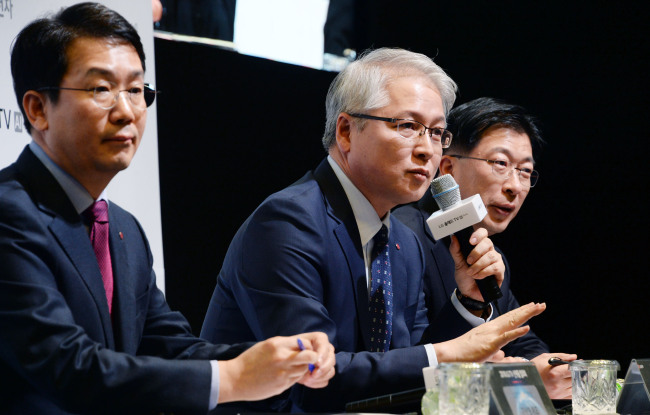LG hopes to lead premium AI TV era with 2018 OLED TVs
Leading appliance maker says AI-powered TV will eventually take over roles of AI speakers
By Won Ho-jungPublished : March 5, 2018 - 17:37
LG Electronics is hoping to lead the era of artificial intelligence-powered TVs with its new lineup of household sets powered by its AI platform ThinQ, the company’s home entertainment chief said Monday.
At a launching event showcasing LG’s premium TV lineup for this year at LG’s R&D center in southern Seoul, Brian Kwon, president of LG’s Home Entertainment Co., told reporters, “In addition to our TVs’ perfect black and perfect visual quality, this will be a year for us to take the next step with artificial intelligence.”
At a launching event showcasing LG’s premium TV lineup for this year at LG’s R&D center in southern Seoul, Brian Kwon, president of LG’s Home Entertainment Co., told reporters, “In addition to our TVs’ perfect black and perfect visual quality, this will be a year for us to take the next step with artificial intelligence.”

This year’s TV products from LG feature the company’s exclusive ThinQ artificial intelligence technology, which allows users to not only search for programs and control the TV through voice activation but also connect to other devices such as smartphones and game consoles through voice commands.
Kwon said that the “strategic issue” for continued success is increasing the size of the premium TV market, as well as the role of organic light-emitting diode TVs within that market. The addition of artificial intelligence and lowering consumer prices are two keys to achieving that, he said.
He said that by 2021, global demand for OLED TVs could hit up to 10 million sets, roughly 10 percent of the worldwide TV market. As for LG, the focus will be on 13 countries including Korea, the US, Australia and 10 countries in Europe, which currently make up nearly 90 percent of revenue for LG’s OLED TVs.
At present, TVs’ artificial intelligence capabilities may seem to overlap with the functions of AI speakers that allow users to control multiple devices through voice commands. However, Kwon said that there is a fundamental difference between the way consumers embrace artificial intelligence through speakers and TVs.
“Speakers are fundamentally personal devices, like smartphones, while TVs are shared devices among family members,” Kwon said, playing down the possibility that the two markets would eat into each other’s demand.
He said that he saw AI speakers as a “bridge product” for consumers who are not ready to switch over completely to new home appliances and electronics with built-in artificial intelligence systems.
“In the long run, I believe that artificial intelligence-powered TVs will be able to take over (the role of AI speakers today),” he added.
In addition to ThinQ, this year’s main lineup of OLED TVs from LG features the Alpha 9 image processor, which automatically works to reduce noise in images and enhance picture quality and depth. For example, the processor can differentiate between the foreground and background in images to adjust brightness and contrast in order to maximize picture quality.
The processor supports up to seven times the color complexity of existing TVs, according to LG.
By Won Ho-jung (hjwon@heraldcorp.com)








![[Kim Seong-kon] Democracy and the future of South Korea](http://res.heraldm.com/phpwas/restmb_idxmake.php?idx=644&simg=/content/image/2024/04/16/20240416050802_0.jpg&u=)







![[KH Explains] Hyundai's full hybrid edge to pay off amid slow transition to pure EVs](http://res.heraldm.com/phpwas/restmb_idxmake.php?idx=652&simg=/content/image/2024/04/18/20240418050645_0.jpg&u=20240418181020)

![[Today’s K-pop] Zico drops snippet of collaboration with Jennie](http://res.heraldm.com/phpwas/restmb_idxmake.php?idx=642&simg=/content/image/2024/04/18/20240418050702_0.jpg&u=)